Vendor Or Supplier Rejection Letter
Subject: Vendor/Supplier Rejection Letter
Dear [Vendor/Supplier Name],
We regret to inform you that your recent application/pitch/proposal dated [Date] for the supply of [Product/Service] to our company has been carefully reviewed and, unfortunately, we have decided not to move forward with your offer at this time.
We appreciate the time and effort you put into preparing and submitting your application/pitch/proposal. It is evident that your organization possesses commendable qualities and capabilities. However, after conducting a thorough evaluation, we have concluded that your offer does not fully align with our current business requirements, objectives, and expectations.
Please understand that our decision is not a reflection of your abilities or the quality of your products/services. We had to consider several factors, including cost-effectiveness, technical specifications, reliability, and compatibility with our existing processes. While your proposal had its merits, we have determined that another vendor/supplier more closely meets our immediate needs.
We value the opportunity to establish long-term partnerships and hope that you will consider future opportunities to collaborate with our company. Your organization is welcome to participate in future requests for proposals (RFPs) or other competitive processes, should they arise. We encourage you to keep an eye on our announcements or visit our website for any such opportunities.
Once again, we appreciate your interest in working with our company and wish you continued success in your business endeavors. We understand that this news may be disappointing, but we genuinely hope that we may have the opportunity to explore potential collaborations in the future.
Thank you for your understanding.
Sincerely,
[Your Name]
[Your Title/Position]
[Your Company Name]
[Your Company Address]
[City, State, ZIP]
[Phone Number]
[Email Address]
Standard Vendor Rejection Email - Professional
Subject: Decision on Your Proposal - [Company Name]
Dear [Vendor Name],
Thank you for submitting your proposal for [specific service/product] dated [date]. We appreciate the time and effort you invested in preparing your comprehensive submission.
After careful evaluation of all proposals received, we regret to inform you that we have decided not to move forward with your offer at this time. Our decision was based on our specific requirements and business objectives for this project.
We want to emphasize that this decision does not reflect negatively on the quality of your services or products. Your proposal demonstrated professionalism and expertise in your field.
We will retain your information in our vendor database for future opportunities that may align better with your capabilities. Should a suitable project arise, we would be pleased to consider working with you again.
We wish you continued success in your business endeavors and thank you once again for your interest in partnering with us.
Best regards,
[Your Name]
[Title]
[Company Name]
[Contact Information]
Cost-Based Rejection Letter - Formal
Subject: Proposal Decision - Budget Considerations
Dear [Vendor Name],
We would like to thank you for your detailed proposal submitted on [date] for [project/service description]. Your team's expertise and proposed approach were impressive and well-presented.
Unfortunately, after thorough review and budget analysis, we must inform you that your proposal exceeds our allocated budget for this project. While we recognize the value in your offering, we are unable to accommodate the proposed pricing structure at this time.
Our procurement committee has made the difficult decision to pursue alternative options that align more closely with our current financial parameters. This decision was purely budgetary and does not reflect on the quality or merit of your proposal.
We hope you will consider participating in future bidding opportunities where budget allocations may be more suitable for your services. We value professional relationships and look forward to potential collaboration in the future.
Thank you for your understanding and continued interest in our organization.
Sincerely,
[Your Name]
[Position]
[Organization Name]
Timeline Mismatch Rejection Email - Straightforward
Subject: Project Timeline Update - [Project Name]
Hello [Vendor Name],
Thank you for your proposal regarding [project description]. We were impressed with your technical capabilities and approach to our requirements.
However, after reviewing our project timeline requirements, we've determined that the proposed delivery schedule does not align with our critical business deadlines. Our project requires completion by [specific date], and your estimated timeline of [their timeline] would not meet our operational needs.
We understand that quality work requires adequate time, and we respect your professional assessment of the project duration. Unfortunately, these timing constraints are non-negotiable due to [brief reason if appropriate].
We appreciate your transparency regarding realistic timelines and hope to collaborate on future projects where scheduling may be more compatible.
Best wishes for your current projects.
Regards,
[Your Name]
[Department]
[Company]
Capability Mismatch Rejection Email - Diplomatic
Subject: Proposal Review Results - [RFP Number]
Dear [Vendor Representative],
We want to express our gratitude for your interest in our [project type] and for taking the time to submit a comprehensive proposal.
After careful evaluation by our technical review committee, we have determined that while your organization possesses many valuable strengths, the specific expertise required for this particular project falls outside your core competencies. Our requirements demand specialized experience in [specific area], which was not adequately addressed in your proposal.
This decision allows us to select a vendor whose capabilities most closely match our unique project requirements. We encourage you to continue pursuing opportunities that better leverage your established strengths and expertise.
We maintain an active vendor database and will certainly consider your organization for future opportunities that align more closely with your service offerings.
Thank you again for your professional approach and interest in working with us.
Warm regards,
[Your Name]
[Title]
[Contact Details]
Post-Evaluation Rejection Letter - Thorough
Subject: Final Decision on Vendor Selection Process
Dear [Vendor Name],
Following an extensive evaluation process, we are writing to inform you of our final vendor selection decision for [project name/description].
Your proposal was evaluated against multiple criteria including technical capability, cost-effectiveness, implementation timeline, past performance, and overall value proposition. While your submission met many of our requirements and demonstrated your organization's capabilities, other proposals more closely aligned with our specific evaluation criteria and strategic objectives.
The selection committee particularly noted [one positive aspect of their proposal] in your submission. However, the competitive nature of this procurement process required us to make difficult choices among several qualified vendors.
We want to thank you for the considerable effort invested in preparing your response to our RFP. The professionalism and quality of your submission reflect well on your organization.
We hope you will continue to monitor our procurement announcements for future opportunities where your expertise may be a stronger match for our requirements.
Respectfully,
[Your Name]
[Procurement Officer]
[Organization]
[Phone/Email]
Internal Policy Rejection Email - Official
Subject: Vendor Application Status Update
Dear [Vendor Name],
Thank you for your interest in becoming an approved vendor for [Company Name] and for completing the vendor qualification process.
After reviewing your application and supporting documentation, we regret to inform you that we cannot approve your organization as a vendor at this time due to internal policy requirements that were not met during the evaluation process.
Specifically, our vendor qualification standards require [mention general policy area without being overly specific - e.g., "certain compliance certifications," "minimum insurance coverage levels," or "established track record in our industry"].
This decision is based strictly on our internal procurement policies and vendor qualification standards, which are applied consistently across all potential vendors.
We appreciate your understanding of our position and encourage you to reapply in the future should your organization's circumstances change in a way that addresses these policy requirements.
Thank you for your interest in working with our organization.
Sincerely,
[Your Name]
[Vendor Relations Manager]
[Company Name]
Competitive Selection Rejection Email - Encouraging
Subject: Thank You for Your Proposal Submission
Hi [Vendor Name],
I wanted to personally reach out regarding your recent proposal for [project/service].
We received an exceptional number of high-quality submissions for this project, which made our selection process both challenging and competitive. After thorough deliberation, we've chosen to move forward with another vendor whose proposal aligned most closely with our immediate needs and constraints.
Your proposal showcased impressive capabilities and innovative solutions that caught our evaluation team's attention. The quality of your work and professional presentation certainly made an impact.
While we couldn't select your proposal for this particular project, I want to emphasize that we were genuinely impressed with what you presented. We'd definitely like to keep the door open for future collaboration opportunities.
I'll make sure your contact information is flagged in our vendor system for priority consideration on upcoming projects that might be a better fit for your expertise.
Thanks again for your time and effort. I hope we'll have the chance to work together soon.
Best,
[Your Name]
[Project Manager]
[Company]
Urgent Project Cancellation Message - Quick
Subject: URGENT: Project Cancellation Notice
Dear [Vendor Name],
We need to inform you immediately that the [project name] for which you submitted a proposal has been cancelled due to unforeseen circumstances beyond our control.
This cancellation affects all vendors who participated in the bidding process, and we sincerely apologize for any inconvenience this may cause your organization.
We understand that you invested time and resources in preparing your proposal, and we genuinely appreciate your efforts and interest in working with us.
While this particular project will not move forward, we hope you'll remain interested in future opportunities with our organization.
We will contact you directly if similar projects arise in the future.
Thank you for your understanding.
[Your Name]
[Title]
[Contact Information]
What is a Vendor or Supplier Rejection Letter and Why Do You Need One
A vendor or supplier rejection letter is a formal business communication used to notify potential suppliers, contractors, or service providers that their proposal, bid, or application has not been selected. These letters serve multiple crucial purposes: maintaining professional relationships, providing closure to the bidding process, preserving your organization's reputation, ensuring legal compliance in procurement processes, and creating documentation for audit trails. They demonstrate respect for the time and effort vendors invested in preparing proposals while clearly communicating business decisions.
When Should You Send Vendor Rejection Letters
- After completing a formal RFP (Request for Proposal) evaluation process
- When budget constraints prevent accepting an otherwise suitable proposal
- If project timelines don't align with vendor capabilities
- When internal policies or compliance requirements aren't met
- Following changes in project scope or cancellation
- After discovering capability mismatches during evaluation
- When selecting a competitor's superior proposal
- If vendor qualifications don't meet minimum standards
- During vendor database cleanup or maintenance
- When legal or regulatory issues prevent partnership
Who Should Send These Rejection Letters
- Procurement officers and purchasing managers
- Project managers overseeing vendor selection
- Department heads responsible for budget allocation
- Vendor relations specialists
- Contract administrators
- Senior executives for high-value partnerships
- HR personnel for service provider selections
- IT managers for technology vendor decisions
- Operations managers for supply chain vendors
- Legal department for compliance-sensitive selections
To Whom Should These Letters Be Addressed
- Primary vendor contact person listed in proposals
- Business development representatives
- Account managers assigned to your organization
- Proposal team leaders or project managers
- Company executives for strategic partnerships
- Sales representatives who initiated contact
- Vendor relationship managers
- Legal representatives for complex agreements
- Technical leads for specialized services
- Regional managers for location-specific services
Essential Requirements and Prerequisites Before Sending
- Complete evaluation of all submitted proposals
- Final decision approval from authorized personnel
- Documentation of selection criteria and scoring
- Review of contractual obligations regarding notifications
- Verification of contact information accuracy
- Legal compliance check for procurement regulations
- Internal stakeholder alignment on messaging
- Timeline confirmation for notification requirements
- Budget approval documentation for selected vendor
- Risk assessment completion for rejected vendors
Proper Formatting Guidelines and Best Practices
Length: Keep letters concise, typically 3-5 paragraphs maximum. Tone: Professional and respectful, avoiding overly apologetic language. Style: Formal business correspondence with clear subject lines. Structure: Open with thanks, state decision clearly, provide brief reasoning, close professionally. Mode: Email for routine rejections, formal letters for high-value partnerships. Language: Use positive framing where possible, avoid detailed criticism. Personalization: Address recipients by name and reference specific proposals. Timing: Send promptly after decisions are finalized, typically within one week.
What to Do After Sending Rejection Letters
- Update vendor database with decision status and reasoning
- File copies in procurement records for audit purposes
- Monitor for acknowledgment receipts or vendor responses
- Prepare for potential vendor inquiries or feedback requests
- Schedule debriefing sessions if contractually required
- Update CRM systems with vendor interaction history
- Brief customer service teams about potential vendor calls
- Review vendor feedback for process improvement opportunities
- Plan communication strategy for selected vendor announcement
- Prepare for potential appeals or grievance procedures
Advantages and Disadvantages of Sending Formal Rejection Letters
Pros: Maintains professional relationships for future opportunities, demonstrates organizational maturity and respect, provides legal documentation of decisions, enhances company reputation in vendor community, creates closure for all parties involved, enables constructive feedback exchange, supports transparent procurement processes.
Cons: Requires time and resources to prepare personalized communications, may prompt vendor inquiries requiring additional responses, could reveal competitive information if not carefully worded, might create expectations for detailed feedback, can generate disappointment or negative vendor relations if poorly handled.
Key Elements and Structure Components
Opening: Professional greeting and acknowledgment of proposal submission. Decision Statement: Clear, unambiguous notification of rejection. Brief Reasoning: General explanation without revealing competitive details. Positive Elements: Recognition of vendor strengths or proposal quality. Future Considerations: Indication of potential future opportunities. Professional Closing: Courteous conclusion with contact information. Attachments: Return of proprietary materials if required. Timing Reference: Mention of evaluation timeline and decision process. Legal Compliance: Include required regulatory language when applicable.
Common Mistakes and Pitfalls to Avoid
- Being too vague about rejection reasons, creating confusion
- Revealing confidential information about competitors or pricing
- Using overly apologetic tone that suggests decision uncertainty
- Delaying notifications beyond reasonable timeframes
- Providing inconsistent messaging across different rejected vendors
- Failing to personalize letters with specific proposal references
- Including false hopes about reconsideration possibilities
- Neglecting to proofread for errors in vendor names or details
- Using generic templates without customization for situation
- Forgetting to update internal systems and vendor databases
Professional Tips and Best Practice Guidelines
- Template Strategy: Develop standardized templates but customize for each situation. Response Time: Aim for 3-5 business days after final decisions. Tone Management: Balance professionalism with human warmth. Documentation: Keep detailed records of all vendor communications. Feedback Approach: Offer general feedback without revealing competitive secrets. Relationship Building: Frame rejections as "not right now" rather than "never." Follow-up Planning: Set calendar reminders for future vendor outreach. Team Coordination: Ensure all team members give consistent messages. Legal Review: Have templates approved by legal counsel initially.
How This Compares to Other Business Communications
Unlike acceptance letters that focus on next steps and contract details, rejection letters emphasize appreciation and future possibilities. They differ from termination notices which end existing relationships, instead maintaining connections for potential future opportunities. Compared to RFP announcements that invite participation, rejection letters provide closure while keeping doors open. Unlike complaint responses that address problems, these letters acknowledge quality work that simply wasn't selected. They're more formal than casual business emails but less detailed than contract negotiations, striking a balance between professionalism and relationship preservation.
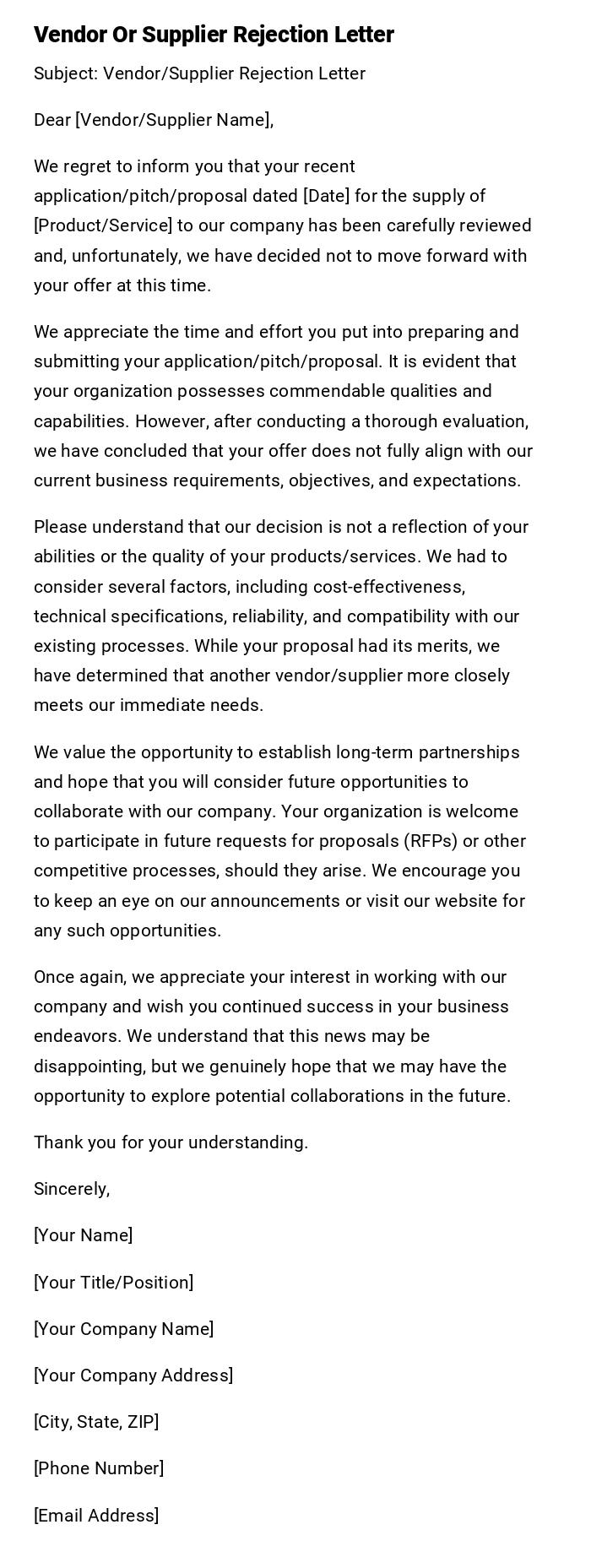
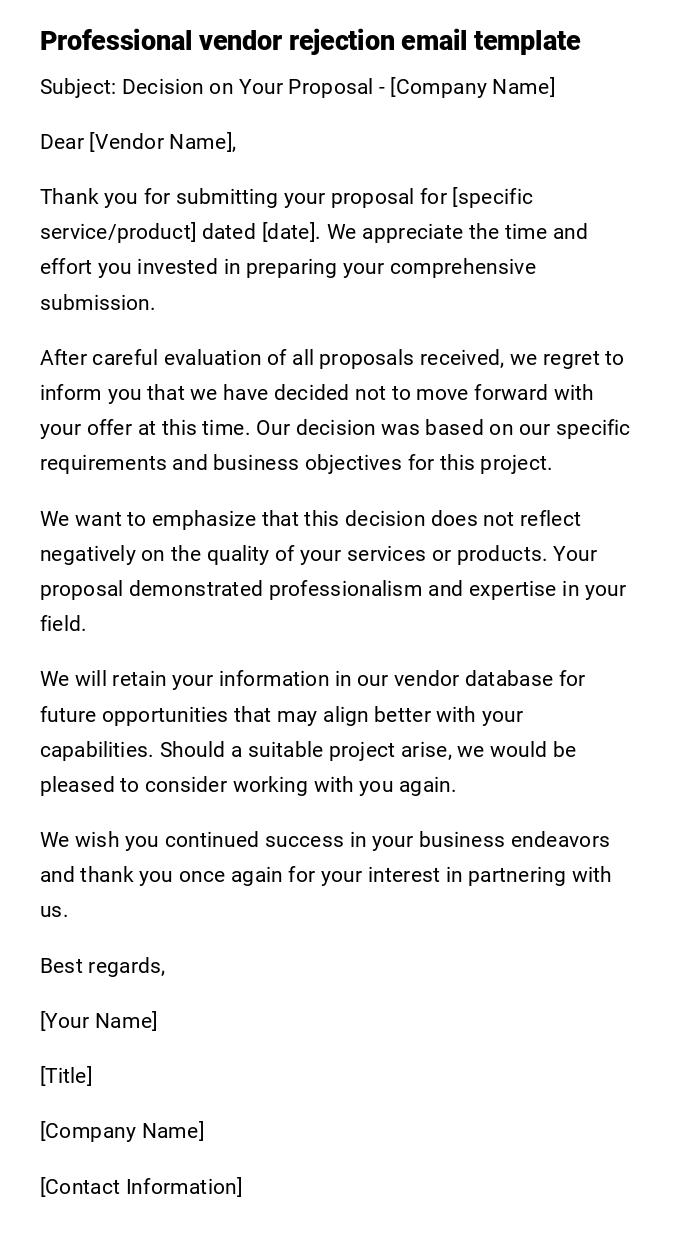
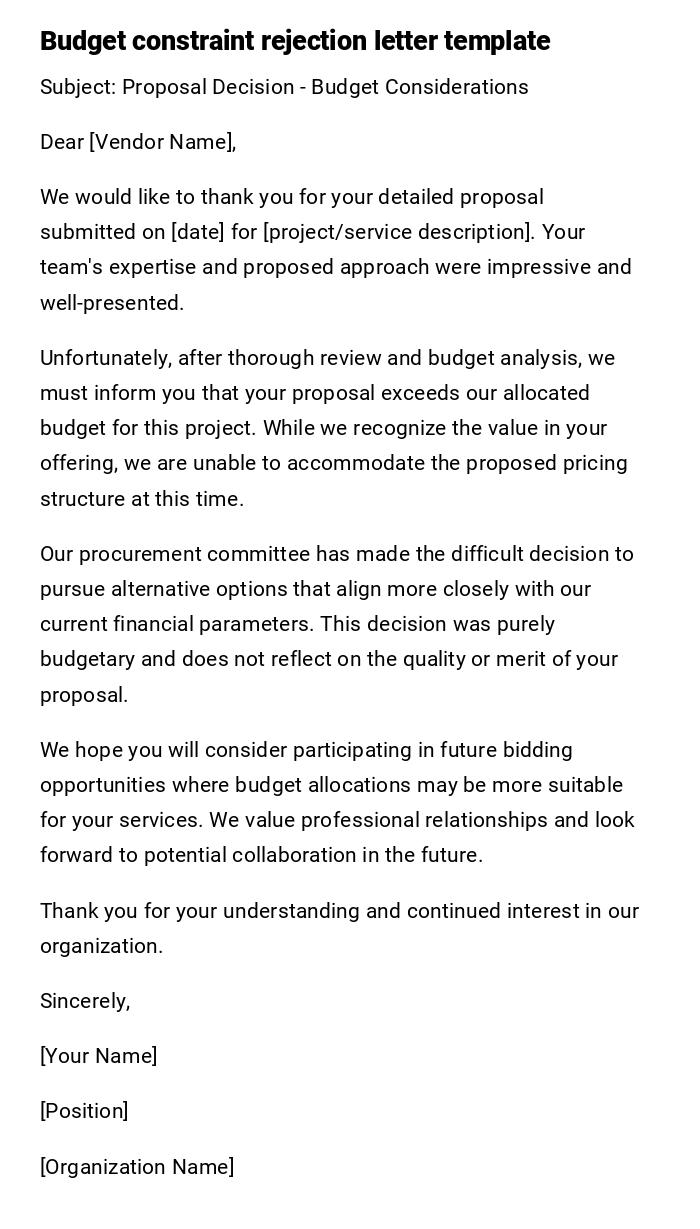
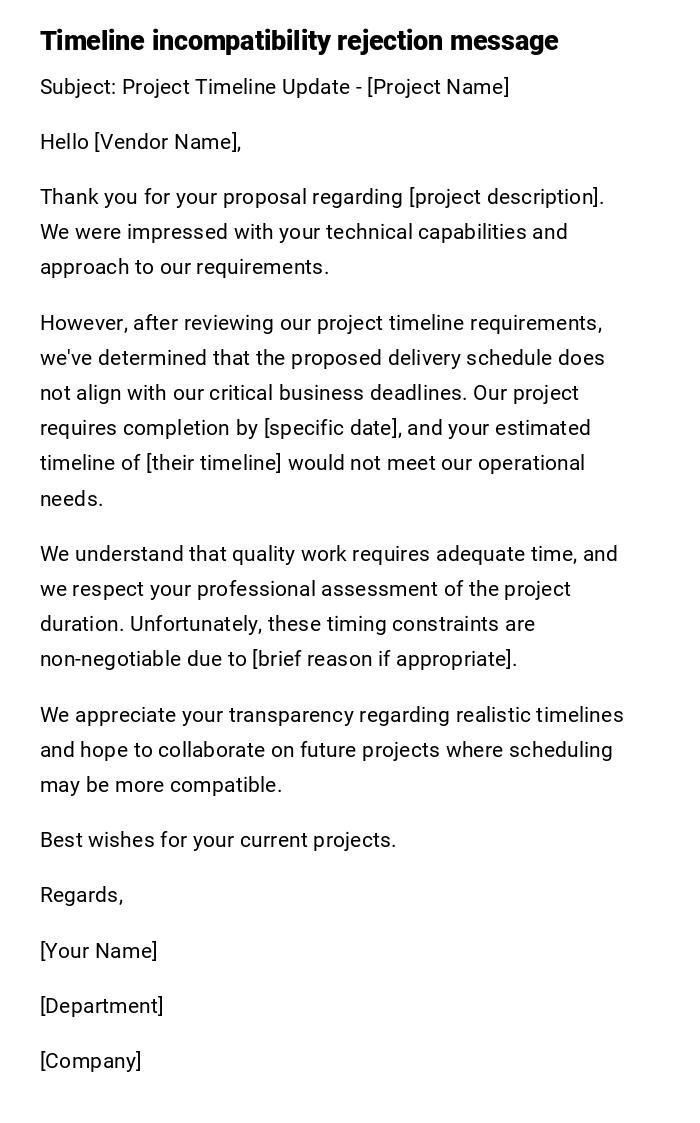
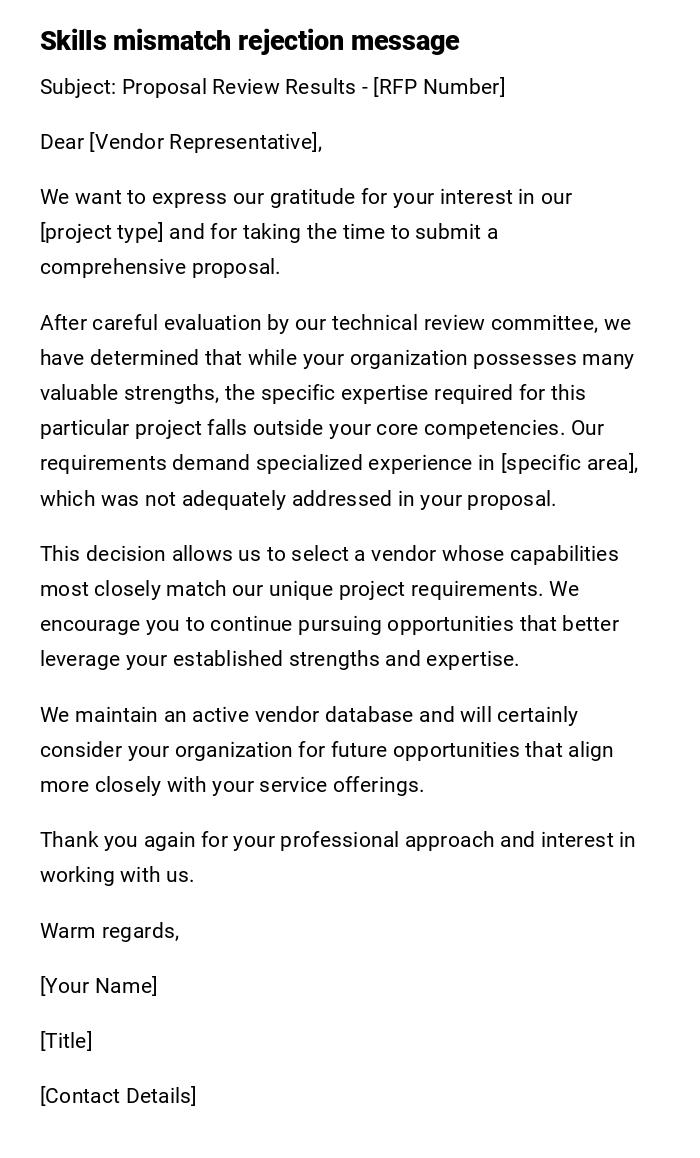
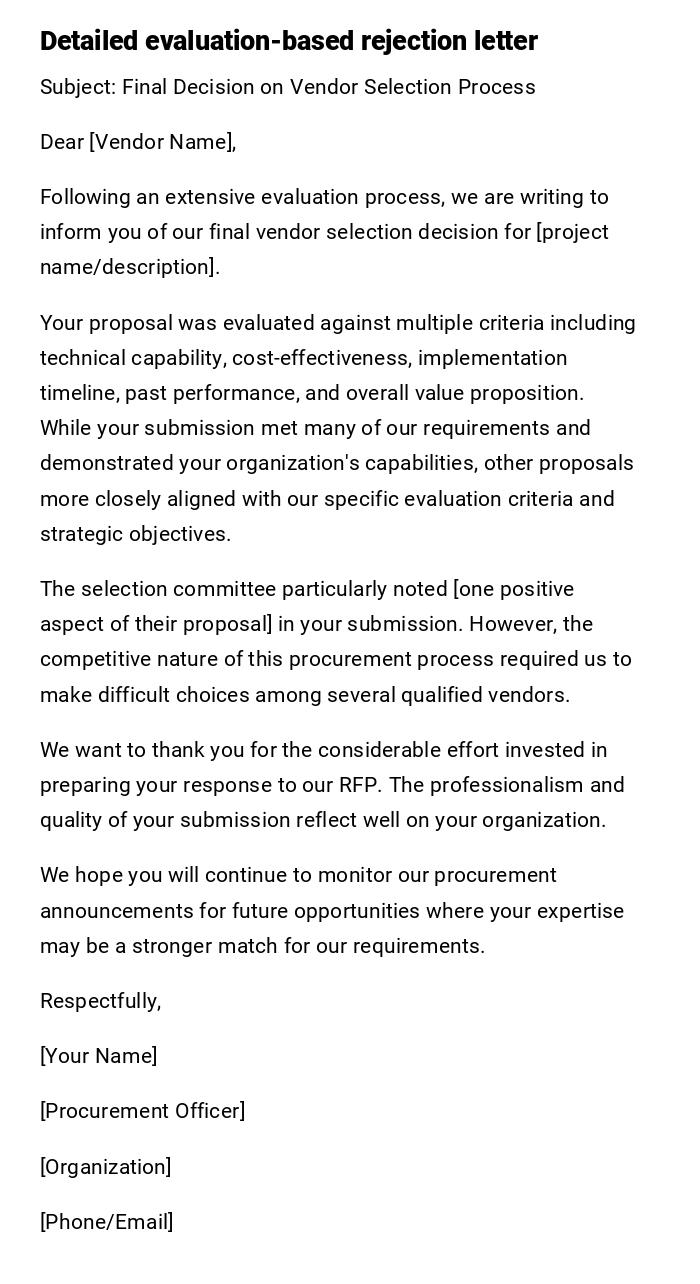
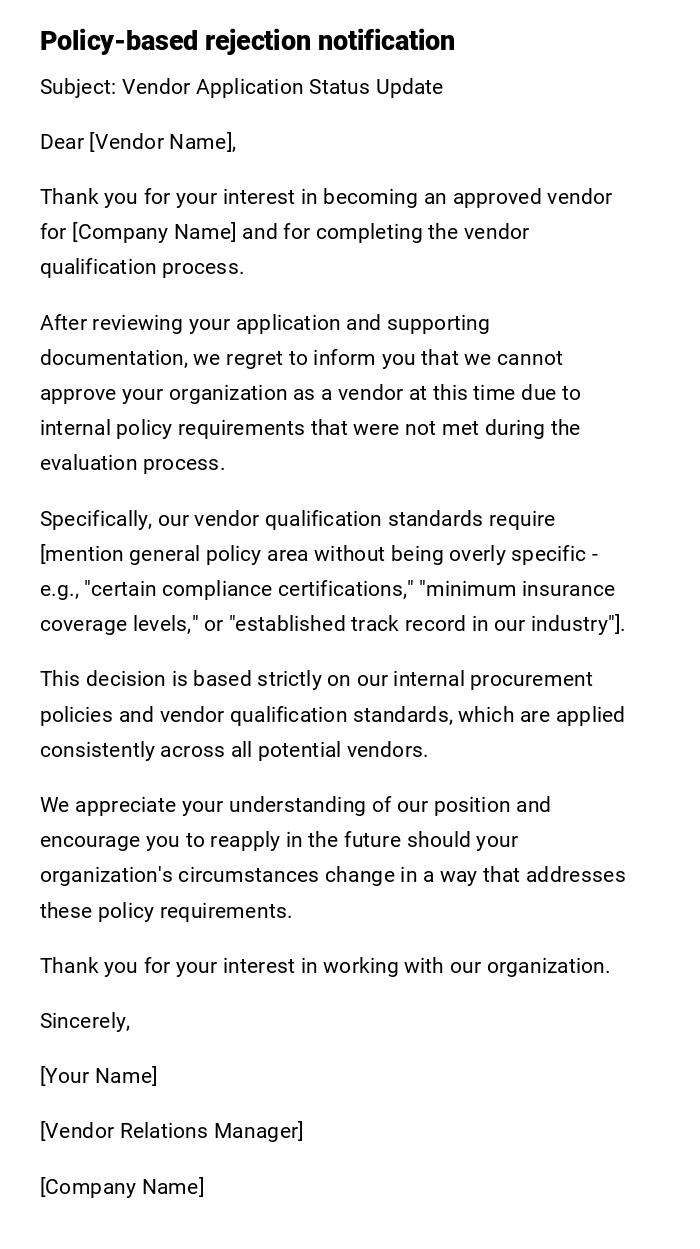
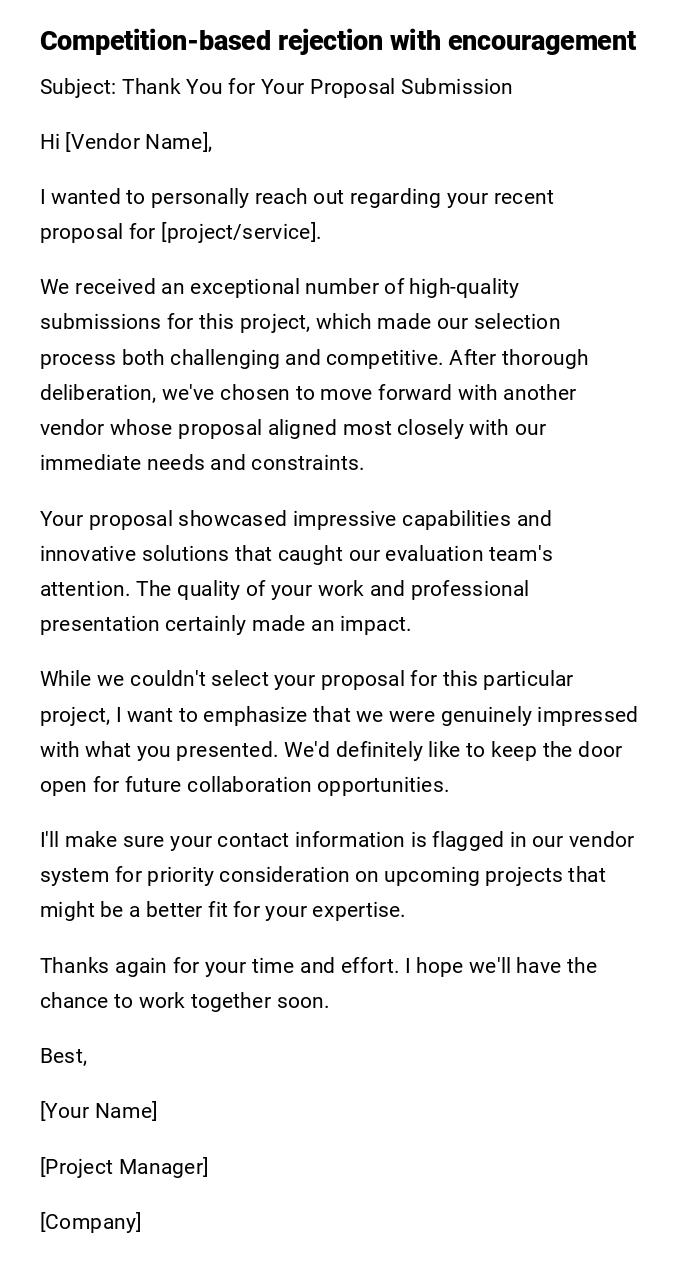
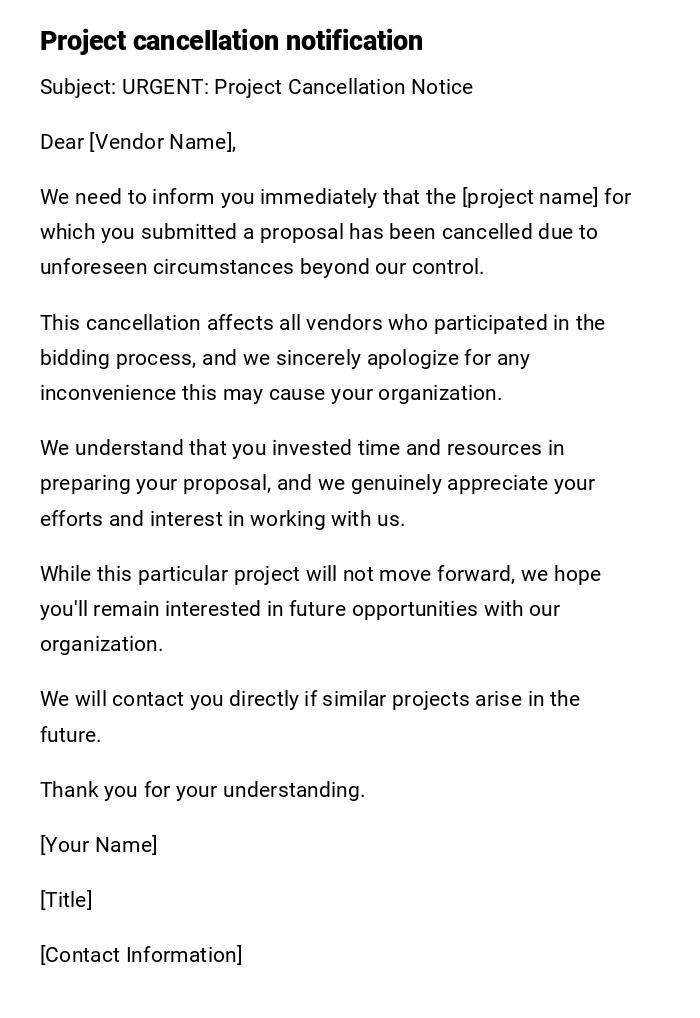

 Download Word Doc
Download Word Doc
 Download PDF
Download PDF